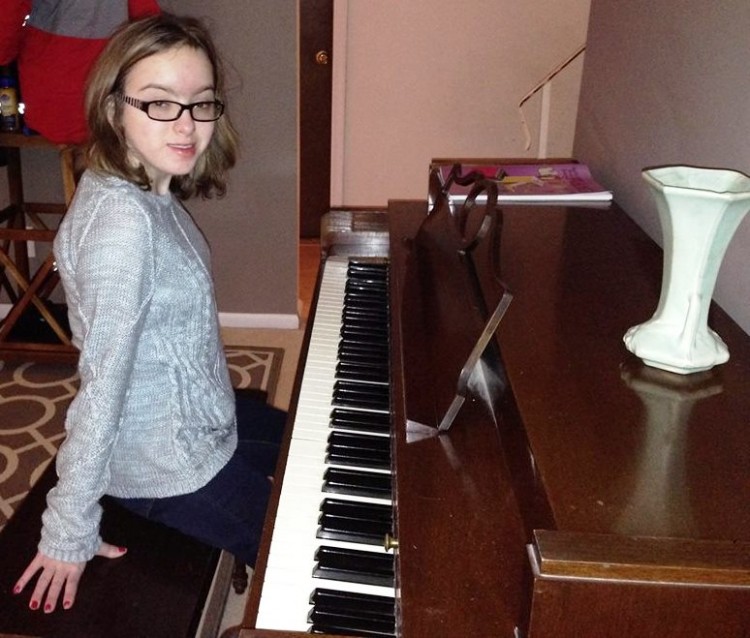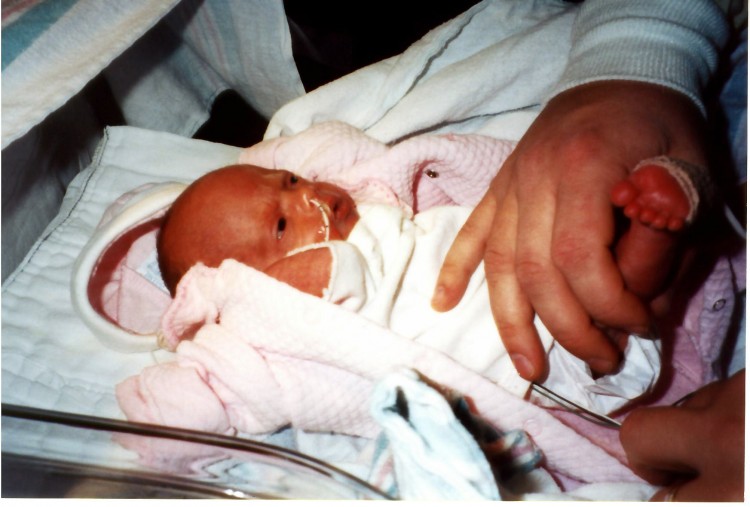My 14-year-old daughter, Shea (pronounced Shay), plays violin in the school orchestra and takes piano lessons. She has an incredible ability to hear and replicate music, and she has the ability to learn a song on the violin and then play it by memory on the piano. As a person who’s never played any instrument, this simply amazes me.
What makes this accomplishment even more amazing is that Shea has a moderate-to-severe bilateral hearing loss. She was born hearing but lost some of that ability early in childhood. Doctors think it’s likely due to a combination of being born premature, low birth weight and also having a hind-brain malformation, called a Chiari Malformation. Shea relies on bilateral hearing aids. She’s learning American Sign Language (ASL) and she’s good at reading lips. In addition to Chiari and her hearing loss, Shea has multiple conditions, which doctors consider “rare.”
Recently, my sister and brother-in-law kindly offered to let our family borrow their 1970’s spinet piano so Shea could practice on something other than the electric keyboard she’d been using in our home. It’s beautiful, but it had not been played for many years. The piano tuner we hired to get it working explained that it was out of tune and would take time and a few more appointments for him to tune it accurately. He also told us it would work fine for her to use for practice. I was so happy to provide this opportunity to my daughter. I had visions of me in the kitchen doing dishes while listening to beautiful piano music coming from our living room. But this didn’t happen.
After we had the piano tuned, Shea just kind of ignored it. I thought it a bit odd given the fact that her piano teacher had told us that when students move from an electronic keyboard to an actual piano, their playing and practice time tends to naturally increase because they’re so excited to be playing on the real deal. When I asked about her lack of playing, she just stated, “I don’t want to…” So, I thought maybe she was just feeling shy about performing in front of others and decided to give her time. Shea has always had a strong will, and the more I would push her to do something, the more she would just dig her heels in the ground in opposition. Her strong will is a double-edged sword at times, but overall it’s served her well. So I just encouraged her and tried to convince myself it was just one of her stubborn phases. Surely, we didn’t just spend almost $500 moving this piano to our home and getting it tuned for it to only sit in our living room and collect dust and junk mail. Shea’s been busy, I reasoned with myself. And then I put it out of my mind.
Yesterday, while I was working away on my laptop, Shea came to me and stated, “I don’t really want to go to piano tonight.” I smiled at her and kindly explained that her father and I had already paid for the piano lessons and therefore skipping would not be an option. Then she proceeded to give me that look. The look that only 14-year-old girls can give their mothers… and she stated, “I don’t think I want to play the piano anymore. I just want to play the violin.” I said to her in a calm and rational voice, “Shea, Dad and I just spent a lot of money to move this piano and getting it tuned. Baby, quitting is not an option. You need to at the very least finish up this year, and then we will discuss it further.” I was not a happy mom at that moment. I was thinking, “What an ungrateful little…” And then I noticed that her eyes were filling with tears and she said, “But I suck!”
I was a little taken aback; she plays beautifully when she tries, and her teachers have said so as well. “You do not suck!” I replied. “What makes you think that you suck anyway? She said, “You should hear me in there, in the lesson, I can’t get this new song right. I sound terrible!” So I gave the typical mom response, “Well maybe if you actually practiced at home on the new piano, which is currently sitting in our living room, that might not be the case!” She said, “But the keys are all wrong, the black keys sound like the white keys are supposed to and the white keys sound like the black ones, and I can’t extend my fingers that far. It’s all wrong, and I can’t do it!”
Honestly, I had no idea what she was talking about. I calmed her down and told her I felt that we needed to talk to her piano teacher about her concerns before making any decisions. Then I wondered, “Did I hire a hack piano tuner? He told me it would be just fine for her to practice on.” I made a mental note to call him and find out exactly what he’d done to mess up our piano. And off we went to her lesson.
As soon as we arrived, I immediately found her teacher and explained to her that Shea thought she sucked and that something must be wrong with our piano. She listened and then she asked Shea to demonstrate for her what was happening on our piano. Shea showed her where C is on our piano at home versus where it should be. The teacher looked at me and she said, “It sounds like it’s playing a little flat, however most students wouldn’t notice this. Shea has a very sensitive ear.” And I thought, “So, my severely hard-of-hearing child has a sensitive ear? How is that possible?” But Shea did notice it, and it was making her not want to practice or play. Her teacher then went on to explain that the song Shea’s currently learning and trying to play, “Yellow” by Coldplay, probably didn’t sound anything like “Yellow” by Coldplay to Shea because she’s so sensitive to pitch.
And then they went on with the piano lesson. I called the piano tuner and explained the issue. And then he stated in a somewhat sarcastic tone, “So she has perfect pitch? Damn, I wish I had that problem.” He’s coming back next week, and he will make sure Shea approves of the tuning before he leaves. Perfect pitch in a hard-of-hearing individual? It seemed so unlikely…
Perfect pitch is a rare auditory phenomenon characterized by the ability of a person to identify or re-create a given musical note without the benefit of a reference tone. It’s estimated that approximately 1 out of 10,000 Americans has perfect pitch. One of its characteristics is assigning musical notes or pitches to everyday objects, like car horns or sirens. Both of my kids have always been interested in tornado sirens. When they were younger, and sometimes even now, when it’s a testing day, they run outside to hear them go off.
I once asked Shea what note or pitch our local siren is, and she said, “I think its F sharp.” So I logged on to Google and asked, “What music tone or pitch is the Federal Signal 2001 Tornado Siren?” Much to my surprise, I actually found the answer — Shea was right.
Prefect pitch is a blessing and a curse. The blessing is being able to tune your own instruments and have the natural ability to learn and play them. The curse is that those with perfect pitch hear every single mistake they make while playing. And without guidance and support, young musicians can become so frustrated with what they see as their own imperfections that they simply give up. Just like Shea almost did. Her piano teacher helped me explain to her what it means to have perfect pitch, and she also told her that she’s to never say “I suck.” It’s OK to say, “I’m not playing as well as I would like to.” But then work harder at it. I asked my daughter if she felt any better about her playing. She was all smiles as she responded with a confident, “Yes.”
Beethoven was deaf, and it’s thought that he had perfect pitch. Who knows, maybe Shea is a new Beethoven!? Maybe she’ll write and compose beautiful music of her own someday. Or maybe she’ll just continue to play music for the love of it. That’s up to her to decide. But, as long as I’m living, I will do all I can to encourage and support her efforts. I’m beyond proud of my baby girl. She’s overcome so many obstacles. She almost died before she was even born, and she only weighed 2 pounds, 8 ounces at birth. There was a time when we didn’t know if she would ever walk or talk. But she’s done that and so much more.
When Shea was registering for sixth grade, she wanted nothing more than to take orchestra and learn to play the violin. Many of her teachers tried to convince us this would not be a good idea because of her hearing loss. But I knew my daughter, and I completely supported her decision. Shea didn’t go down the logical path that many would suggest for a child who has severe hearing loss. And thank God! I’m so grateful that I listened to that inner Mama Bear voice, that maternal gut instinct. I trusted myself, but more important, I listened to my child. And wow! She continues to amaze me each and every day.
She’s a child with many rare medical conditions, but she’s also a rare gift. And I will do all I can to make sure she explores it until her beautiful heart is content.
Want to end the stigma around disability? Like us on Facebook.
And sign up for what we hope will be your favorite thing to read at night.


